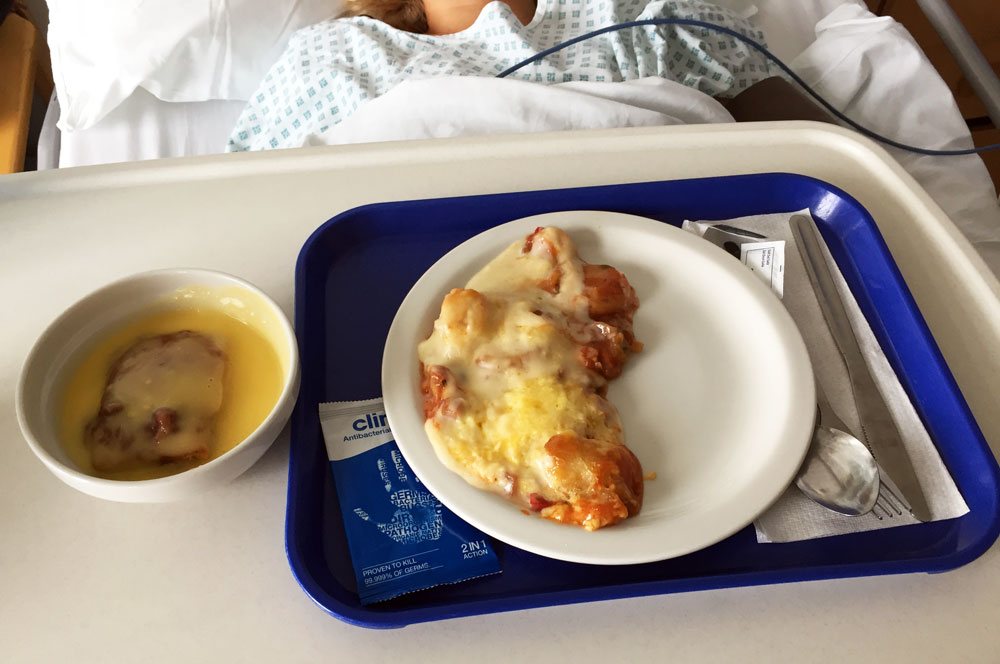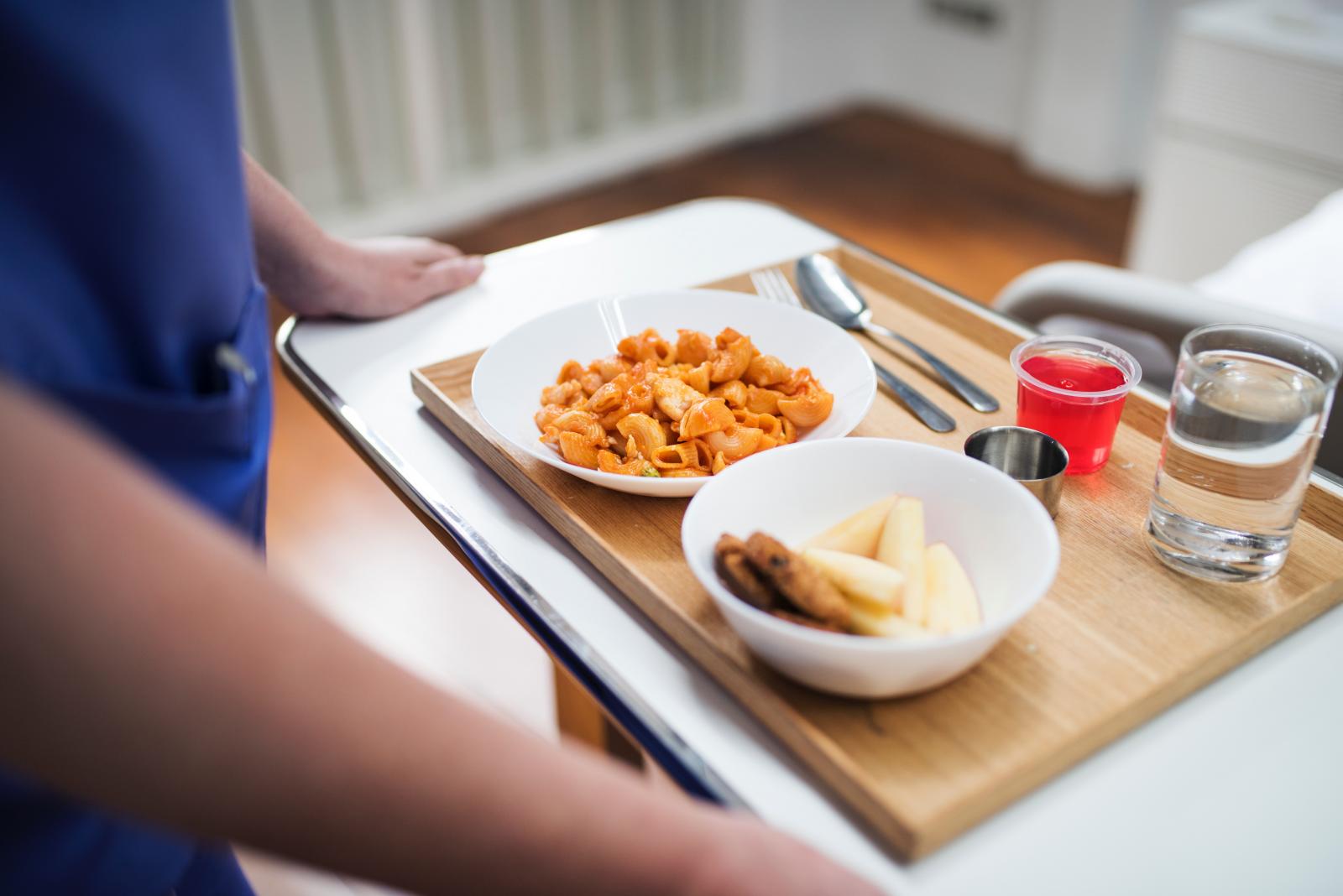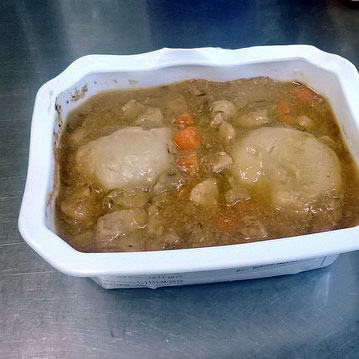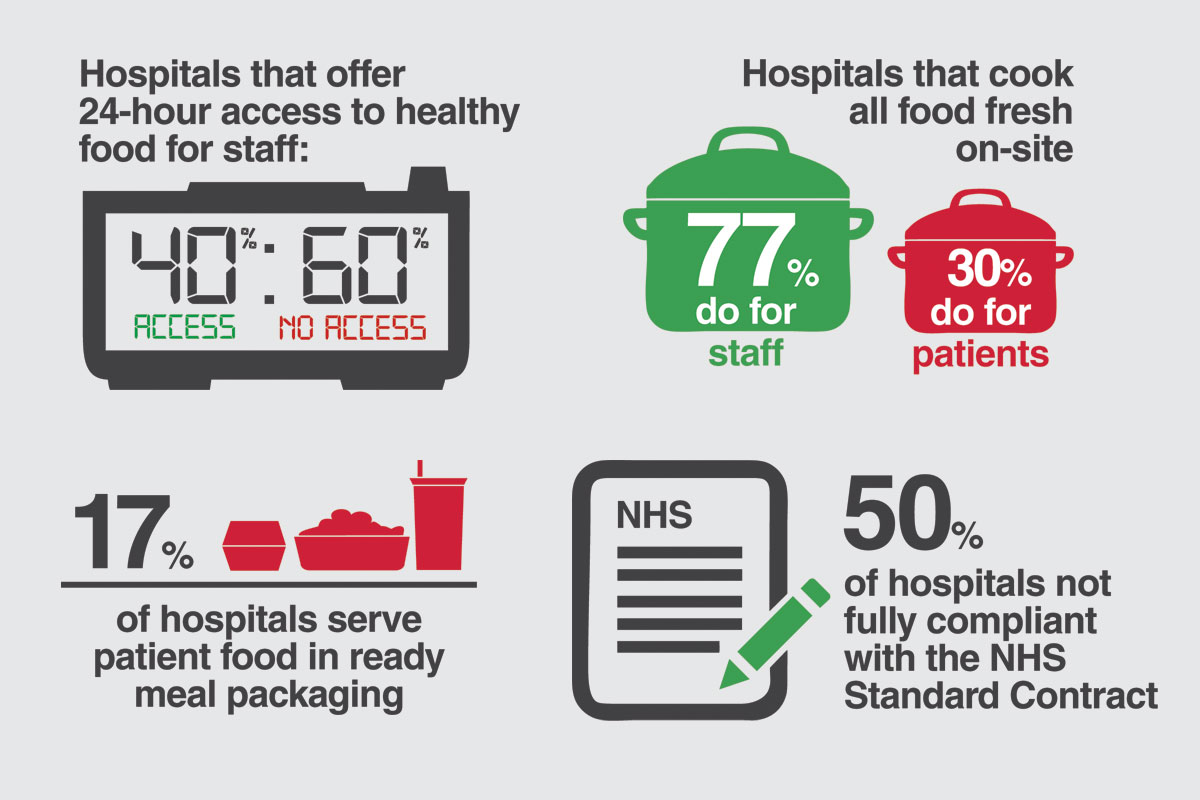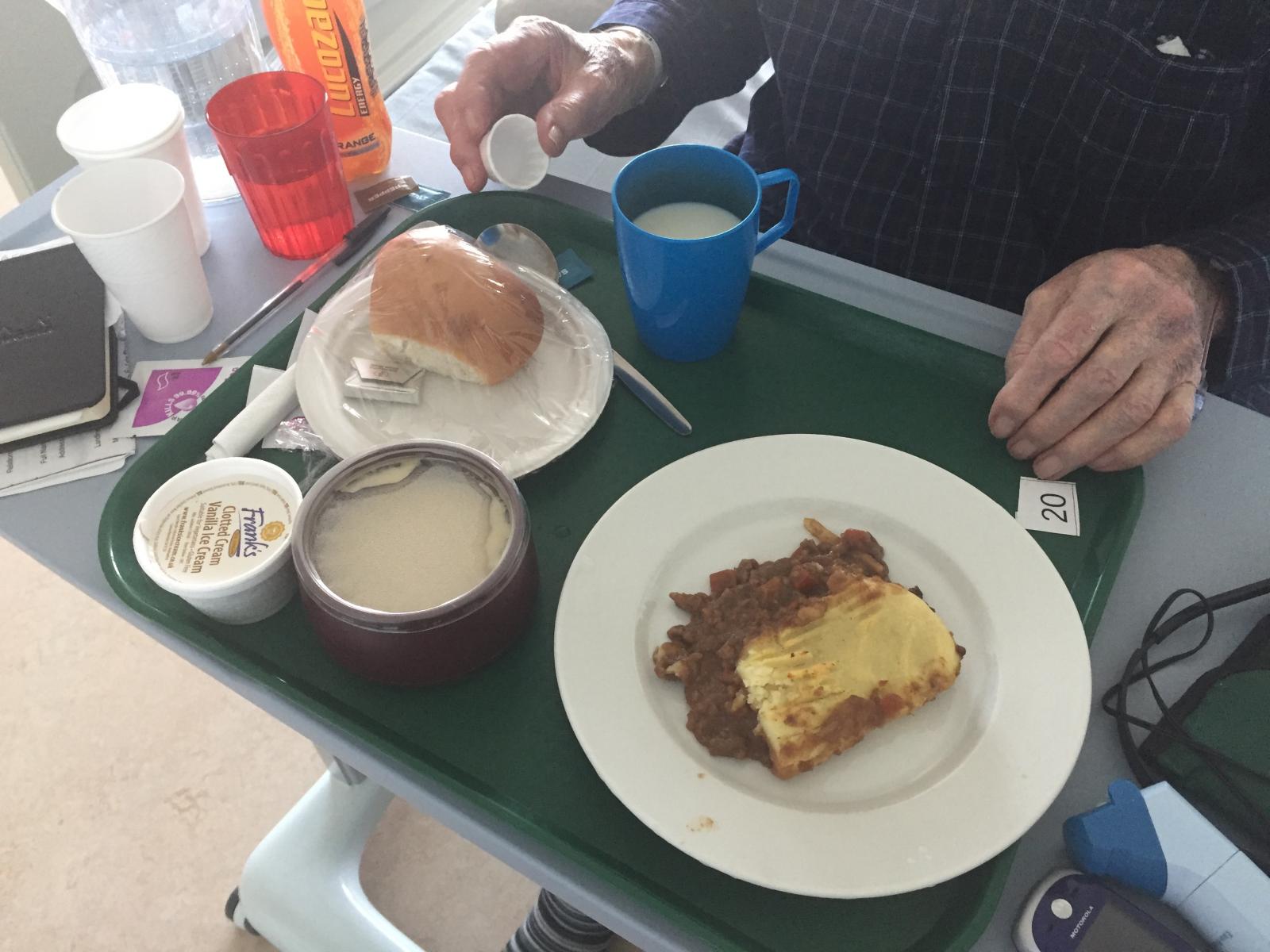Patients tell me, you wouldn't serve this food to pigs
And they're right: A hospital head chef's brutally honest confession
- Anonymous head chef of 30 years at an NHS hospital reveals all about food
- Used to prepare fresh meals from scratch in kitchen before new scheme
- He now presses button for trolley to reheat meals from frozen to piping hot
- Used to bake cakes - now it's a limited pre-bought ones with little flavour
My working week kicks off on a Sunday, which means preparing a roast lunch. Even just a few years ago, this would have involved chopping up a load of fresh vegetables, sticking a joint or two in the oven, and preparing a vat of stock for the gravy on the stove. As the flavours infused, the smells would have wafted down the corridor, helping whet patients' appetites.
But today I'm reheating a bland lump of frozen meat - and a measly portion, at that. It's lying in a pool of water with its flavours slowly being washed out; when it's heated through, the ends will curl up and go brown at the edges. Not surprisingly, lots of it will be left on the plate once the patients have finished eating, and end up in the bin.
Over my 30 years as an NHS chef, I've collected a pile of letters from grateful patients, saying how much they enjoyed the meals I cooked, and their chats with me. It makes me proud to read them.
But recently that's changed, and increasingly I'm getting letters from angry relatives criticising the poor choice of meals, saying it all looks 'disgusting' or that you wouldn't feed it to pigs.
I have to agree with them.
The worst part of my job is heading out to the wards with the trolley. I don't want to make eye contact with the patients. If I hear someone ask 'Who cooked that?' I put my head down and run past. It's mortifying.
I don't want to glorify the past. It's never been perfect. But two years ago my hospital trust switched to a new system and the quality of the food has plummeted. Now, instead of preparing fresh meals from scratch in the kitchen, like many hospitals across the UK we buy in meals from an outsourced caterer that are pre-cooked and frozen.
My job as head chef now is to take the plastic trays out of the freezer and slide them onto one of dozens of racks inside the 'regen trolley' - there's space for 30 meals. I then press a button for the trolley to 'regenerate' - or reheat - the meals for 90 minutes until they're piping hot.
If they're not at least 75c when the timer goes off (I check with a food thermometer), I have to press the 'boost' button to superblast it for another ten minutes.
There are no more cooking smells to tempt patients. And by the time this food is ready to serve, it might as well be pork or chicken or beef - or cardboard; you can't really taste or smell it to tell the difference.
The meat is stringy or tough, with some slices inevitably overcooked, even burnt. I only have packet gravy to make it palatable, but that tends to taste very salty. And after 90 minutes in its own water, the frozen, diced veg ends up soft, soggy and flavourless - sprouts are slimy, the swede looks anaemic.
Sure enough, once we wheel the trolley out to the ward today, three of the patients don't want the roast they'd ordered any more. This often happens once they set eyes on the food.
It was easier to accommodate this in the old days because I could make them something else.
Now my options are limited - I can make them a salad, or an omelette. Thankfully, these patients are happy with cheese omelettes.
Some of our patients will be on a ward for several weeks at a time, so they become familiar with the menu - which probably explains why today in another corner of the hospital we've had orders for 17 of my salads and not the hot option. That used to be unheard of in winter, as most patients wanted the more warming, traditional dishes.
I have no doubt these ready meals have the right amount of minerals and vitamins (though I suspect cooking like this must destroy them), but they are not appetising. And what ill patients need is nourishment, feeding up.
I've tasted the food and it's not good. The roast meats have no flavour, the cheese dishes are salty. And you can't get away from that artificial, chemical taste everything has. Campaigners calling for better NHS food say the meals in our hospitals are worse and cheaper than in prison. I can believe that. Early in my career I did some training in a prison kitchen and was offered a job there. I wasn't keen on prison life, but even then the product was of a higher quality.
Catering in prisons and schools is subject to compulsory national standards. That's not the case in the NHS in England. A recent study found that nine million hospital meals go uneaten every year - that's one in 12. In our hospital, we definitely see a lot more food left on plates now, although management has stopped us from keeping records.
I often see visitors bringing in pizzas and Chinese takeaways to their relatives - it's the same across the country, with six out of ten patients relying on their families to bring them food.
After doing my rounds with the trolley, I do a stock take, and clean the kitchen floors and shelves - there's no one else to do it.
Since the switchover to ready meals, a quarter of the equipment in my kitchen - items such as bains-marie and steaming ovens - has been removed to make way for huge upright freezers. I've also lost seven staff. Now it's just me, with a catering assistant to do some of the evening duties.
I have all this experience, but now I've been reduced to a trolley dolly who just presses a button.
It's demoralising, as I want to use the skills I've learned. But, more importantly, it breaks my heart to think we're serving frail, elderly patients the sort of thing you could pick up for 99p in a budget supermarket.
That's why, in my spare time, I'm studying for my diploma in health and safety - I'm looking for another job, as there's a good chance there won't be one here for me much longer, especially when it can be done by a catering assistant with a few days of training.
After the stock take, it's time to get the cakes ready for tea at 3.30pm. We used to do all our own baking - fruit cake, carrot cake, Victoria sponge, eclairs, jam tarts - and they went down well. Now it's a limited choice of pre-bought cakes, with little flavour.
After that, I begin the prep for the evening meal. I make up a batch of fresh carrot and coriander soup - it's one of the few bits of real cooking I still manage to do these days, so I really enjoy it.
The other hot option tonight is a ready-meal, quiche. Cooking a quiche from frozen in the trolley means the base tends to become waterlogged and runny. I've tried everything I can think of, but it always comes out like that.
So I recently decided to do an impromptu survey to get an idea of what the patients really think of the food. We gave forms to 150 patients, asking them to rate everything from taste to temperature to appearance.
The results came back about half positive and half negative, with nice remarks about how friendly the staff are. But one patient called for us to 'bring back home cooking', while another says: 'I was a patient here two-and-a-half years ago and the meal was of a much higher standard.' The appearance of food was rated as generally poor.
Our trust used to be rated as 'outstanding' for catering. Now it's among the bottom.
Once a week we get our dry stores delivery - this includes 50 tins of baked beans, 12 kilos of custard powder, about ten kilos of porridge and four cases of digestives (there are 20 packets in each case). We get through about 4,000 tea bags a week, too.
It may sound like a lot, but tellingly, one of our store rooms that used to be full of dry food is now solely dedicated to supplements - things like high-protein drinks and milkshakes for patients at risk of malnutrition, or probiotics to help the immune system for patients on antibiotics. They taste fine, but they're very expensive.
Last year it was reported that NHS hospitals spend more on nutritional supplements than actual food, and that doesn't surprise me.
Previously, if we had a malnourished patient, we'd work with a dietitian to find ways to build them up - by adding more cream to their sauces, or putting more sugar in their custard, for example. And by talking to the patient and making them feel special, it encourages them to eat.
Now they just get put on a course of build-up milkshake - it worries me. I am sure it's got all the nutrients, but humans need real food. We take pleasure in it and think food is one way to help people recover.
It's especially important in a small hospital like this one, in South-West England, where patients tend to stay a bit longer, perhaps recovering after an operation.
We also now have an increasing number of people with special diets - whether it's gluten-free, lactose-free, pureed, low sodium or low potassium. While there are ready meals designed to suit each one, there's no flexibility - today we had a patient who can't have either gluten or lactose.
Although I can offer a gluten-free chicken casserole, that may contain dairy. If you're cooking from scratch, you can prepare a separate version.
Fortunately, we're close enough to town so I can send out one of the domestic staff to pick up bits and pieces when we need them. We dip into the petty cash for that sort of thing. Strictly speaking the money is not meant to be used for catering, but what else am I supposed to do? I can't let them starve.
Recently, we had a 90-year-old lady who could only eat soft food and didn't like the look of anything on the menu. She told me the only thing she wanted was skate wings. So I nipped out in my lunch break to buy some and she was soon eating for the first time in weeks.
That's the personal side of my job that I relish the most. When I can do it, it's priceless.
I dread Fridays the most - as it's fish and chips day. This is one of the worst meals you can put in a regen trolley.
As the fish is far denser, the chips tend to come out overcooked. And patients struggle with the hard batter. It's one of the main complaints we get at the end of a week.
What might surprise people is that it's not purely about saving money - certainly not at our hospital. I've read that, according to Department of Health figures, some hospitals spend as little as 69p on each meal.
That's not the case here. As head chef, I used to have access to budget reports - a few years ago it cost £5.75 to feed a patient for one day, and I've been told the food budget is roughly the same today. Where they seem to have made savings is the massive reduction in staff.
I know there will always be budget constraints. But good, wholesome food is one of the simplest ways to help vulnerable people on the road to recovery.
It's a shame that the NHS can no longer see this.
Daily Mail
18 February 2014
Published Tuesday 18 February 2014
Better Hospital Food: The campaign represents a coalition of organisations calling on the Westminster government to introduce mandatory nutritional, environmental and ethical standards for food served to patients in NHS hospitals in England.
